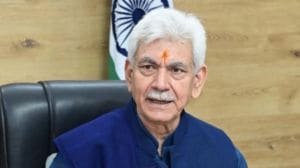I believe in the famous saying ‘If you can dream it, you can have it’, and keeping that in mind, I worked towards my dream of pursuing a higher degree from a foreign university. At present, I am enrolled for a master’s degree in Computer Science from the University of California, Los Angeles (UCLA).
It all began in high school when I developed a strong interest in computer science. I completed my undergraduate from Vellore Institute of Technology, however, towards the end of my college life, I still felt that my knowledge was lacking and there was much more I wanted to learn. I was specifically interested in machine learning and understanding the mathematics behind data models. After learning independently, I decided to get a master’s degree in Computer Science in the US.
Story continues below this ad
UCLA — the college that lives up to its hype
UCLA was one of the top colleges on my application list. I was awed by the different labs on campus that were specialising in various domains of machine learning research. It was a dream to get a chance to be a part of the graduate programme and I can say without a doubt that the experience lived up to the hype I had created in my head.
My course was generic in its naming since it was just an MS in Computer Science but it afforded us a lot of flexibility in what we wanted to study. The first week of every academic quarter, we had the privilege of going course shopping. This involved attending all the classes that seemed interesting on paper and deciding whether the course material and professor’s teaching style resonated with us. We could finalise what we wanted to study for the rest of the quarter by the end of this week.
I chose to specialise more in natural language processing but I also did courses revolving around generic machine learning, data science, computer vision and foundational software engineering. Our academic programme required us to complete nine courses (either computer science, mathematics, statistics or other related engineering fields) for graduation, though you could choose to do more. Most of the courses had a lot of graded practical projects that improved my coding skills and gave me confidence in my abilities. There were a few courses that were more research-oriented and revolved around the professor’s research domain.
My experience with the professors prepared me to sift through lots of research papers in a limited time while retaining the salient points of each of them. However, the method of teaching at UCLA differed a lot from my undergraduate experience. The practical aspects of the coursework combined with the requirement of in-depth theoretical knowledge made it stand out for me. The projects were hands-on and relevant to the tasks I would perform at the job I took up after my graduation.
Story continues below this ad
The best thing about coming to UCLA was that I was surrounded by like-minded people who shared the same passion for academics and computers. Each of them was an expert in something and being among them I got to learn much more rather than just relying on what was taught in the course. You get introduced to such intelligent people who ask questions which are way ahead of what is being taught in the classroom. Many times, the professors would try to answer the question but sometimes they too would be stumped. In such cases, they would make a note and reprise the topic in the next few classes once they found an answer for it. It almost felt like we all were learning together.
Admission process – researching, scholarships, loans
I handled the application process mostly by myself. Professional counselling services were expensive and helped with completing applications and writing statements of purpose, which I felt I could do on my own. Instead of spending the money there, I decided to spend that money on applying to a few more universities with good computer science programmes.
To shortlist universities, I reached out to seniors who had successfully secured admissions from top universities worldwide. Online forums for students were also a huge help. I realised that I needed to secure good GRE and TOEFL scores to get a seat for the colleges I was targeting. I got those out of the way nine months before the applications were due.
Through this process, I have learned that the most important aspect of applying to graduate programmes is your resume and your SOP. While academic performance does help add value to your resume, I concentrated more on my research and personal projects. I felt they would showcase my interests and help set me apart from the other applicants.
Story continues below this ad
Studying abroad without financial help from parents
I looked at many different options to secure a loan for my graduate studies. My parents had already paid for my undergraduate college so I wanted to avoid taking any additional help from them. We did talk to a few banks but the only way to secure a low interest rate required collateral from my parents. While my parents were on board with this idea, I was against it.
I eventually came across Prodigy Finance which offered me a loan based on my academic background and admission. No collateral was required and the interest rate was much better than what we had discussed with the banks. The online application took around an hour to fill and at the end of it, I had the conditional grant in my hand. In such cases, the disbursement is sent directly to the college before the start of every academic quarter and the additional money was deposited into my US bank account by my college.
After my graduation from UCLA, I secured a job at Amazon Web Services (AWS). Due to the financial plan I had opted for, I was allowed up to 20 years for repayment without penalty. The tech field has recently suffered a lot of layoffs due to a possible recession. I do worry about these things but I try to not let it impact my day-to-day life. With this in mind, I used my funds judiciously and became debt-free in just one year.
Living the American dream
Coming abroad to study was always a dream for me, and when this dream came true, it was all worth it. When I reached the UCLA campus, it lived up to my expectations.
Story continues below this ad
The first day was full of orientations, meet and greets and a lot of events. I met many people that day of which a few became my closest friends. UCLA organised a tour of Los Angeles which I thoroughly enjoyed as it gave me the chance to explore the beautiful city. They also scheduled a tour of the UCLA campus where we learnt about the campus buildings, the history of the college and saw some of the famous spots such as the place where Einstein stood on campus, the room which is regarded as the birthplace of the internet etc.
For me, the biggest challenge was managing housework while getting used to the graduate programme. Like me, there were many of my batchmates who were living alone for the first time. We were learning a lot of basic survival skills on the go while juggling our education and part-time jobs.
One of my biggest nightmares was when our house in particular suffered from a severe cockroach infestation. We were five guys living in a two bedroom apartment. For most of us, this was our first experience staying on our own while attempting to be self-sufficient (grocery shopping, cooking, cleaning etc). Combined with our varied hectic schedules, we would invariably have spills on the stove, dirty utensils piled up in the sink and a kitchen that was always in use. This eventually led to a full-blown cockroach infestation. We purchased bug spray in bulk and spent many a night going on killing sprees around the house. Multiple rounds of fumigation helped bring the infestation under control.
Fellow students and locals were a huge help throughout this whole experience of living alone in a foreign country. They would guide us to the cheapest places to get the best deals on groceries and everyday supplies. There were instances where I would find myself lost on the huge campus and would have to rely on the kindness of strangers to find my way around. Many times I was invited for dinner to the houses of my classmates. We also found ourselves dumpster diving for furniture quite often since we couldn’t afford to buy our own. We actually secured the Barcalounger (recliner chair) for our living room from the street outside our apartment building.
Story continues below this ad
Also, I did some of my research beforehand when it came to surviving in this country. I had reached out to my seniors since I was aware of the high cost of living and tuition fees (still lesser than other colleges given it is a public university) before coming to UCLA. I secured a list of email addresses of all professors with labs at UCLA the summer before the programme started. What followed was a lot of cold emailing and rejections. Eventually, I was able to get an interview with a professor and secure a graduate student researcher position at a lab.
Throughout UCLA, I ensured that I was on the university payroll as a student researcher. This allowed me free insurance and a 50 per cent remittance on my tuition. I would typically work 10 hours a week but I could set my own schedule. I was awarded a small stipend per month which mostly went towards my rent payments. I also ended up as an author in a geriatric psychiatry research paper for my work at the lab so that was a cherry on top of the cake.
My advice is to decide what you want to learn and specialise in, and then to continue working towards that goal regardless of where you wind up. A lot of people get caught up in getting internship opportunities and preparing for interviews when they start their graduate courses. While those are important, you might regret missing out on the academic experience offered at the university since it is hard to come back once you leave. Also, make sure to participate in as many cultural events as possible. It offers an interesting opportunity to meet people from diverse backgrounds.
(This letter is part of a series by The Indian Express where we bring to you the experiences of students at different foreign universities. From scholarships and loans to food and cultural experiences — students tell us how life is different in those countries and things they are learning other than academics)

































